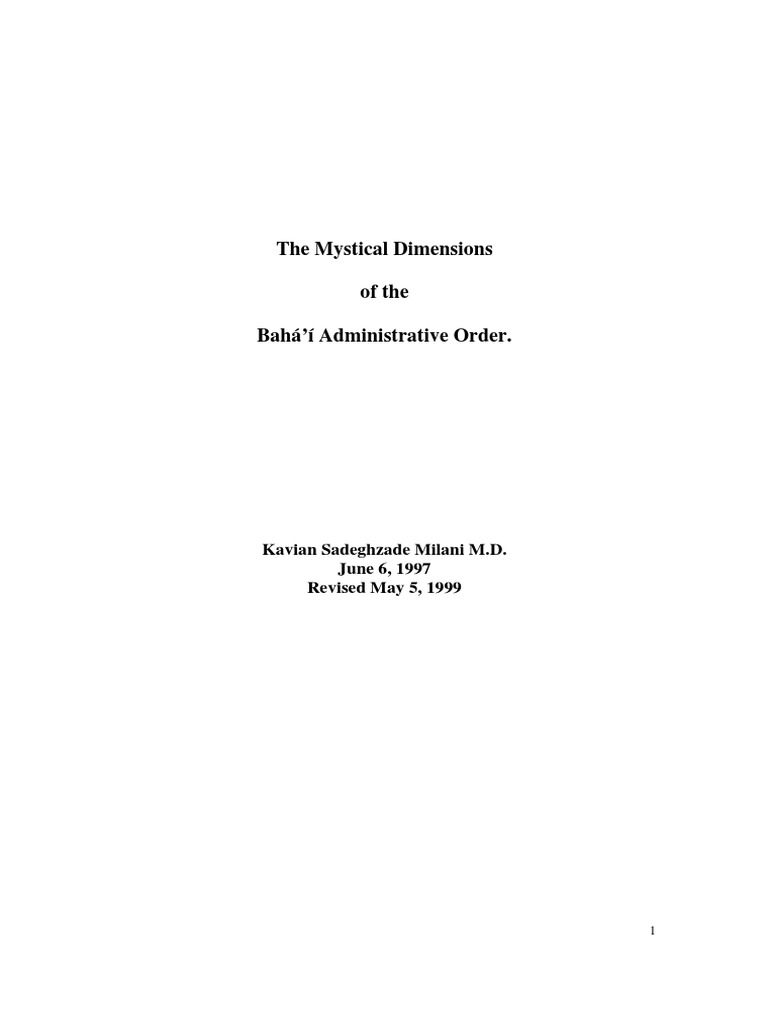The Bahá’í Administrative Order stands as a remarkably intriguing component of the Bahá’í Faith, uniquely designed to foster a cohesive society and advance the principles of world unity. Central to the teachings of Bahá’u’lláh, the founder of the Bahá’í Faith, this system embodies the spiritual and administrative principles that herald a new era of governance and social harmony. This discourse will elucidate various aspects of this administrative order, delineating its foundational tenets, structural entities, and its role in manifesting a unified global civilization.
1. The Essence of the Bahá’í Administrative Order
The Bahá’í Administrative Order is fundamentally predicated upon the synthesis of spirituality and social organization. It seeks to harmonize the individual and collective aspects of human life, which is a reflection of the overarching Bahá’í belief in the oneness of humanity. In this vision, governance is not merely a secular obligation but an essential expression of divine will. Thus, the Administrative Order is imbued with a spiritual dimension that inspires both leaders and followers to strive for a moral and just society.
At its core, this administrative framework aims to create a structured society wherein principles such as equality, justice, and consultation become the bedrock upon which community life is established. The vision of Bahá’u’lláh posits that a well-ordered administrative mechanism reinforces these principles, facilitating cooperative governance at both local and global levels.
2. The Structural Framework
The Bahá’í Administrative Order is characterized by a distinct hierarchical structure composed of elected and appointed bodies. Its foundational elements are the Local Spiritual Assemblies, the National Spiritual Assemblies, and the Universal House of Justice. Each level serves specific functions, enabling robust participation of the community in governance while ensuring organic unity across the spectrum.
Local Spiritual Assemblies form the grassroots level, serving a diverse range of functions—from organizing community activities to ensuring the welfare of its members. These bodies are composed of nine elected members, chosen through a process devoid of nominations, thereby emphasizing the purity of intention and the genuine will of the electorate.
The National Spiritual Assemblies operate at the regional level, providing an essential link between local communities and the Universal House of Justice. They are tasked with broader administrative responsibilities, including the promotion of the Bahá’í teachings, the coordination of community development projects, and the representation of Bahá’í interests within the wider society.
The Universal House of Justice represents the apex of the Bahá’í Administrative Order. Established in 1963, it holds the unique responsibility of overseeing the entire Bahá’í community worldwide, making decisions on matters affecting the Faith. Importantly, it is elected by indirect voting, highlighting the collective conscience of the global community, and is seen as the embodiment of divine guidance in the application of Bahá’í principles.
3. Principles Guiding the Administrative Order
The functioning of the Bahá’í Administrative Order is intricately woven with several guiding principles, essential for ensuring effective governance while fostering spiritual growth. Among these principles, the concepts of consultation, equality, and service are particularly significant.
Consultation is a hallmark of decision-making within the Bahá’í community. It is grounded in the belief that collective deliberation leads to more insightful and holistic conclusions than individualistic approaches. Members are encouraged to express their opinions freely, fostering an atmosphere of trust and respect, thereby enhancing community bonds.
Equality, another cornerstone principle, emphasizes the importance of equal participation in the administrative functions and accessibility to opportunities. It encourages the dismantling of biases related to gender, class, or any other form of discrimination that could impede progress.
Service is inseparable from the spiritual ethos that permeates the Bahá’í Administrative Order. Every act of governance is seen as an opportunity to serve humanity. The concept of service engenders a sense of responsibility in leaders to act with integrity and altruism, thereby fostering a model of governance reflective of higher spiritual aspirations.
4. Achievements and Challenges
Over the years, the Bahá’í Administrative Order has witnessed substantial achievements in promoting community development, educational initiatives, and service-oriented projects globally. These efforts manifest the teachings of Bahá’u’lláh in tangible forms, contributing significantly to societal advancement.
However, the Administrative Order is not without its challenges. Navigating the complexities of sociopolitical contexts, especially in regions where Bahá’ís face persecution, poses significant hurdles. Upholding the principles of the administration in such environments remains a focal concern, emphasizing the need for resilience and unwavering commitment to the ideals of service and justice.
5. The Future of the Bahá’í Administrative Order
As the world grapples with multifaceted challenges, the Bahá’í Administrative Order offers a compelling model for contemporary governance, advocating for an approach that harmonizes spirituality with practical administration. Looking ahead, it is poised to play a vital role in the establishment of a global federation, facilitating international cooperation and understanding.
Through continued adherence to its principles, the Bahá’í Administrative Order seeks not only to empower individuals but also to lay the groundwork for a world characterized by justice and peace. As communities worldwide engage with its teachings, the potential for a unified world beckons, marking a significant step towards realizing the vision of a harmonious global society.
Ultimately, the Bahá’í Administrative Order is not merely a system of governance but an invitation to embody the spiritual qualities that can transform human civilization. It serves as a testament to the belief that, united in diversity, humanity can ascend to new heights of achievement and fulfillment.
